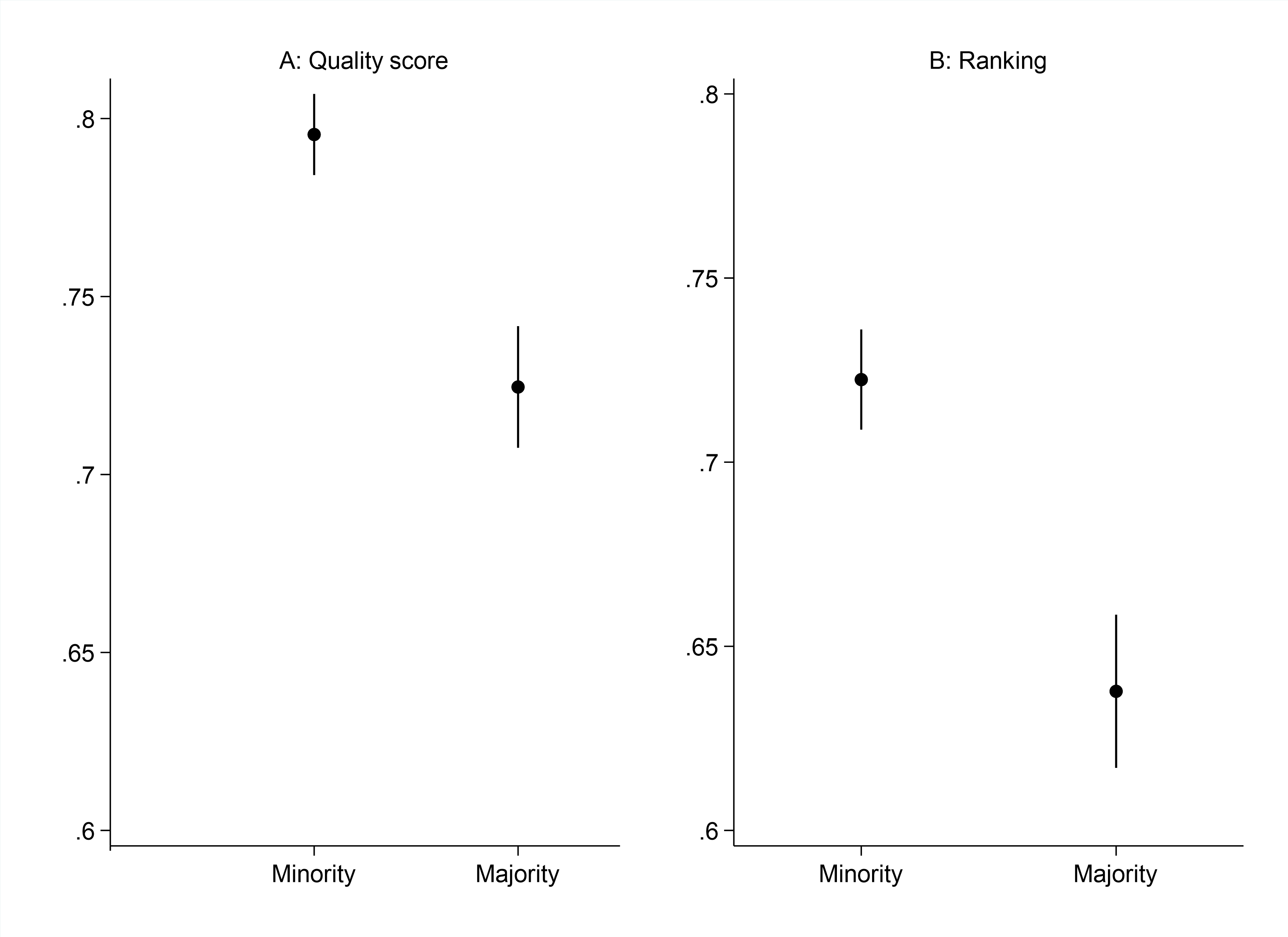We study whether political preferences affect the uptake of social programs, and find that supporters of the party or the presidential figure tend to substitute political endorsements for information while detractors learned more from the information sessions. This would imply that increasing the uptake of social policies in highly polarized societies might require marketing strategies that are specifically tailored to the political preferences of different groups.
Despite the increased academic interest in the causes, consequences, and ways to address political polarization in many different topics, very few papers have examined this specific question. The literature shows that political preferences affect a myriad of policy-related opinions and one important study found that uptake of Obamacare varied with partisanship and de-emphasizing the role of government in the policy decreased the uptake gap. But even though political polarization is a concern around the world, the effects of preferences on uptake have not been addressed in other contexts, with the noteworthy exception of recent interest in the takeup of Covid-19-related behaviors.
In our recent contribution to the JOP – “Do political preferences affect policy learning and uptake? Evidence from a field experiment with informal entrepreneurs” – we report the results of a field experiment conducted in low-income communities in the Western suburbs of Rio de Janeiro, Brazil. Our goal in this study, which was part of Egap’s Metaketa II initiative, was to examine the uptake of a business tax and social security simplification and subsidy scheme, known simply as the MEI program (shorthand for individual microentrepreneur in Portuguese). While the program’s social and economic aggregate cost-benefit is debatable, its terms are extremely advantageous for beneficiaries. Upon formalizing as an MEI, individuals must make small fixed monthly payments that cover all local, state, and federal taxes and grant access to the federal social security system at greatly subsidized rates. Formalization also provides business advantages, such as access to wholesale prices in goods and services, increased access to financing, and the possibility of benefiting from tax subsidies to hire an employee. The program has proved quite popular, with close to 15 million current beneficiaries. However, a considerable number of individual microentrepreneurs remain informal.
The main arm of our field experiment was designed to evaluate whether providing information and technical assistance increased MEI uptake. In the endorsement arm, we also manipulated the salience of the association of the MEI program with then former (and now, again, incumbent) president Lula, under whose auspices the program was introduced in 2009. A few months after administering the treatments, we collected survey and administrative data that allowed us to observe three uptake-related outcomes: intent to formalize, actual formalization, and formalization and compliance with tax payments. We expected that individuals in both treatment arms would be more likely to formalize than those in the control group and that supporters of Lula in the endorsement arm would be more likely than detractors to formalize as MEI.
The information and assistance treatment did indeed increase formalization rates across our three outcomes, as expected. Effects hoovered around 5 percentage points over an extremely low baseline rate. We found, however, only weak evidence that supporters of the enacting president were more likely than detractors to take it up. While this ran contrary to our initial expectations, it does not mean that stressing the political associations of Lula with the policy had no behavioral effects.
We found, unexpectedly, that detractors of the president learned much more about the MEI program than supporters when the program’s political connections were mentioned. This implies that supporters formalized at higher rates given levels of knowledge, which, in turn, implies that supporters’ uptake was of a “lower quality,” because it was based on less information. The evidence, in short, suggests that supporters of Lula relied on his political endorsement and did not invest in knowledge acquisition while detractors, on the other hand, seem to have learned more about the program from the exact same information sessions. Why, then, did detractors and supporters sign up for MEI at similar rates? With an increased knowledge about the program, detractors might have realized that its terms were very advantageous for them and were able to overcome any suspicions derived from Lula’s association with the MEI program. We speculate, then, that for less clearly advantageous programs, this logic would lead to greater divergence in takeup between detractors and supporters.
Our study was not originally designed to identify and fully understand this substitution effect, so more research is necessary. But, if supporters did indeed substitute political endorsements for information while detractors learned more from the information sessions, it shows that information has asymmetric effects that are driven by political preferences. This would imply that in highly polarized societies, increasing uptake of social policies might require strategies that are specifically tailored to the political preferences of different groups.
This blog piece is based on the forthcoming Journal of Politics article “Do Political Preferences Affect Policy Learning and Uptake? Evidence from a Field Experiment with Informal Entrepreneurs” by Cesar Zucco, Anna-Katharina Lenz, Rafael Goldszmidt, and Martín Valdivia.
The empirical analysis has been successfully replicated by the JOP and the replication files are available in the JOP Dataverse.
About the Authors
Cesar Zucco is Associate Professor in the Getulio Vargas Foundation, Brazil, whose research interests lie in comparative politics and public policy with a regional focus on Latin America. For more information visit his website.
Anna-Katharina Lenz is the Lance & Diane White Assistant Professor of Entrepreneurship at Miami University, Ohio. Her research interest lies in entrepreneurship, poverty, and inequality, and particularly interested in how to facilitate entrepreneurship at the Base-of-the-Pyramid. For more information visit her website.
Rafael Goldszmidt is Assistant Professor in Getulio Vargas Foundation, Brazil. He specializes in quantitative methods applied to social and behavioral sciences and his research is focused on behavioral change. For additional information, see his website and follow him on Twitter: @RGoldszmidt.
Martín Valdivia is Senior Researcher at the Grupo de Análisis para el Desarrollo, Peru. His fields of interest include entrepreneurship, financial inclusion, rural development and more recently democratic governance. His website provides additional information.


